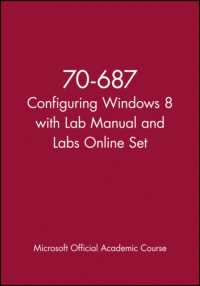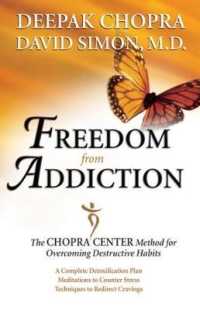Full Description
This book makes the case for assessment of student learning as a vehicle for equity in higher education. The book proceeds through a framework of "why, what, how, and now what." The opening chapters present the case for infusing equity into assessment, arguing that assessment professionals can and should be activists in advancing equity, given the historic and systemic use of assessment as an impediment to the educational access and attainment of historically marginalized populations. The "what" chapters offer definitions of emerging terms, discuss the narratives of equity in evidence of student learning, present models and approaches to promoting equity, and explore the relationship between knowledge systems and assessment practice. The "how" chapters begin by progressively moving from the classroom to the program, then beyond the program level to share examples from student affairs. Subsequent chapters address the problem of equitable access to STEM fields; culturally responsive practices within the context of community colleges; the ongoing work of culturally situated assessment practices in Historically Black Colleges and Universities; and the role of technology-enabled assessment as a possible tool for equitable assessment. The final two chapters in the book address the "now what", providing a way for assessment professional to develop individual awareness within their practice as a next step in the equity journey, and a conceptual framework to anchor equity in their work.
Contents
Table of Contents Preface Part One. Why? 1. Why the Intersection of Assessment and Equity?—Erick Montenegro and Gavin Henning 2. The Assessment Activist. A Revolutionary Call to Action — DivyaSamuga_Gyaanam+Bheda 3. Equity and Assessment. A Storied Past—Natasha A. Jankowski and Anne E. Lundquist Part Two. What? 4. Current State of Scholarship on Assessment—Gianina Baker and Gavin Henning 5. The Varied Roles of Narratives and Stories in Assessment—Natasha A. Jankowski and Lesley D'Souza 6. Models and Approaches to Increasing Equity in Higher Education—Karen Singer-Freeman, Linda Bastone, and Erick Montenegro 7. Equity-Centered Assessment. Varying Approaches and Lenses—Stephanie Waterman, Gianina Baker, Gavin Henning, and Anne E. Lundquist Part Three. How? 8. Assessment in Class Meetings. Transparency Reduces Systemic Inequities—Many-Anne Winklemes 9. Culturally Relevant Assessment. Examining Equity Gaps in Assignment Types—Harriet Hobbs and Chrisine Robinson 10. Centering 'Āina in Assessment. Striving for Equity and Social Justice—Monica Stitt-Bergh, Charmaine Mangram, Eunice Leung Brekke, Kara Plamann Wagoner, Monique Chyba, Kaiwipunikauikawēkiu Lipe, & Siobhán Ní Dhonacha 11. Culturally Relevant Assessment 2.0 Through Faculty and Students' Voices—Chiara Logli 12. The Need for Equity-Minded Assessment and Evaluation Outside of the Classroom—Juan G. Berumen 13. Advancing Equity in Student Affairs Through Assessment Practice—Ciji A. Heiser and Joseph D. Levy 14. Assessing Equitable Access to STEM Fields of Study—Alicia C. Dowd, Leticia Oseguera, and Royel M. Johnson 15. Equitable Assessment in Community Colleges. A Call for Collaboration and Culturally Responsive Practices—Raina Dyer-Barr, Kaylan Baxter, and Eboni M. Zamani-Gallaher 16. Cultural Awareness and Praxis. The Aesthetic of Teaching and Learning at HBCUs—Verna F. Orr Part Four. Now What? 17. Leveraging Technology-Enabled Assessment Capabilities to Advance Students' Achievement of Equitable Learning Outcomes for Equitable Assessment—Peggy L. Maki 18. Developing Individual Awareness. The Role of the Assessor—Danielle Acheampong, Marilee Bresciani Ludvik, and Anne E. Lundquist 19. An Invitation to a Beginning Rather Than the End—Divya Samuga_Gyaanam+Bheda , Natasha A. Jankowski, and Peter Felten Editors and Contributors Index








